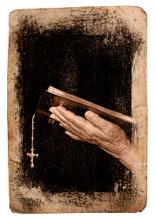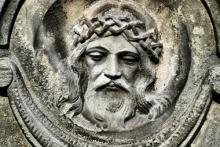Bible
A few links on some creative outdoor sculptures, the etymology of the name Spider-Man, Disney's Bible theme-park that was never made, a new form of mashups, President Obama and Entourage, and cover of Adele played on the Chinese zither.
Atheist activism is hardly news these days. Folks are feeling increasingly convicted about taking their disbelief public, and more specifically, pointing out the damage done by religion.
But it seems the most recent publicity campaign by a group called American Atheists has gone a little too far, even for those not in the religious sphere.
Human rights groups howled when the following billboard appeared in Harrisburg, Pennsylvania:
Following a public uproar, the billboard promptly was replaced with one for the local symphony.
There are some more obvious concerns this kind of campaign raises, while others are more subtle. The point of the billboard is well taken, at least for me; the Bible has some messed up stories and rules in it. But cherry-picking isolated quotes like this from scripture is something that most in mainline Christianity consider a no-no. It’s called proof-texting, and it’s seen as tantamount to using the Bible as a weapon to further a personal agenda.

We’ve been hearing a lot in the news media lately about women’s bodies. Just when we thought the messy fight over contraception was over, Democrats and Republicans are butting heads again over renewal of the 1994 Violence Against Women Act, a once widely supported bill that is now being met with opposition from Republicans due to new provisions that “would allow more battered illegal immigrants to claim temporary visas, and would include same-sex couples in programs for domestic violence,” according to the New York Times.

While compiling the morning “Daily Digest,” I often recall the advice of Karl Barth, who is said to have told young theologians “to take your Bible and take your newspaper, and read both. But interpret newspapers from your Bible.”
There are many mornings that Jesus’ advice comes to mind after reading the news. When you hear of wars and rumors of wars, do not be alarmed; this must take place, but the end is still to come (Mark 13:7). While I am not an end times apocalyptic, there are days that Jesus’ prophecy seems all too real.

There was a movement back in the 1960s that many of us only have read about, while others vividly remember. Philosophers and theologians explored what was labeled the “Death of God” movement. Interest in the subject has re-emerged particularly as of late because William Hamilton, one of the more prominent voices in the Death of God movement, diedlast week at age 87.
The movement inspired TIME Magazine’s now-famous cover (seen here) in 1966, raising the question in the public forum: Is God Dead? The cover has since been listed by the Los Angeles Times as one of the “Ten Covers that Shook the World.”
Hamilton’s faith was shaken during his teenage years when three of his friends were making a homemade pipe bomb. The project went wrong and detonated, killing two of the three boys.
The two killed were Christians. The lone survivor, an atheist.
Hamilton’s crisis of faith centered around a theological concept known as theodicy, which explores the question: why do bad things happen to good people? More specifically, why does misfortune seem to befall the faithful, while those lacking faith enjoy what seems to be a providential hall pass?

Editor’s Note: At 3:30 p.m. on Saturday, March 27, 2004, when I was the religion reporter for the Chicago Sun-Times, I met then-State Sen. Barack Obama at Café Baci, a small coffee shop at 330 S. Michigan Avenue in Chicago, for an interview about his faith. Our conversation took place a few days after he’d clinched the Democratic nomination for the U.S. Senate seat that he eventually won, and four months before he’d be formally introduced to the rest of the nation during his famous keynote speech at the 2004 Democratic National Conventio.
We spoke for more than an hour. He came alone. He answered everything I asked without notes or hesitation. The profile of Obama that grew from the interview at Cafe Baci became the first in a series in the Sun-Times called “The God Factor,” which would eventually became my first book, The God Factor: Inside the Spiritual Lives of Public People, in which Obama and 31 other high-profile “culture shapers” — including Bono of U2, Nobel Laureate Elie Wiesel, the author Anne Rice and President George W. Bush's speechwriter Michael Gerson — are profiled.
Because of the seemingly evergreen interest in President Obama’s faith and spiritual predilections, and because that 2004 interview remains the longest and most in-depth he’s granted publicly about his faith, I thought it might be helpful to share the transcript of our conversation — uncut and in its entirety — here on God’s Politics.
~ Cathleen Falsani
LONDON — Britain's powerful media advertising watchdog has banned a Christian group from claiming on its website and brochures that God's cure-all powers can heal a string of medical ailments.
The Advertising Standards Authority, the independent regulator of advertising in all British media, ruled that the ads generated by the group Healing on the Streets are irresponsible and misleading.
The ASA, whose tight rules are considered among the world's most stringent, cites a leaflet produced by the group from its center in the spa town of Bath, England, claiming that God "can heal you from any sickness."
“The poor will always be with you,” Jesus once said, and for centuries his followers have struggled to understand what he meant.
Or maybe not.
“The poor will always be with you” — especially if you’re not poor — seems straightforward enough: Look around, people ! The poor (and their problems) are very much with us!
Viewed through this kind of realpolitik lens, this verse (and the Bible generally) pose no real interpretive challenges to our reading or our living. The world, regrettably, is simply thus. The poor, alas, will always be with us.
Liberating Biblcal Study: Scholarship, Art, and Action in Honor of the Center and Library for the Bible and Social Justice, edited by Laura Dykstra and Ched Myers.

Having critics isn’t a bad thing. Sometimes they serve as a sort of public accountability. Other times, they express questions that others might be asking but haven’t voiced.
Marvin Olasky, editor in chief of World Magazine, came out with a quick critique of Sojourners’ press release celebrating the Obama Administration’s decision to reject the current plans for building the Keystone XL pipeline. His post offers an excellent opportunity to address a few things that others might have been wondering as well.
His headline? “Sojourners and Keystone: Using the Bible for Political Purposes.”

As someone who self-identifies as an evangelical Christian, often I begin to feel like the subject of a Discovery Channel documentary, particularly in the midst of a heated presidential election cycle.
It’s Evangelical Week here on Discovery! Travel with us as our explorers track the elusive evangelical in its native habitats. Watch as evangelicals worship, work and play, all captured on film with the latest high definition technology. And follow our intrepid documentary team members as they bravely venture into the most dangerous of exotic evangelical locations — the voting booth!
I understand the interest in us evangelicals, I really do. The way much of the mainstream media covers our communities in the news can make us seem like a puzzling subspecies of the American population, not unlike the Rocky Mountain long-haired yeti.
Are we really that difficult to comprehend?
In a word, yes.

In a recent column for USA Today, Gary Bauer (former GOP presidential candidate and President of a conservative political organization called American Values) makes a big biblical blunder. He addresses the issue of the role of faith in politics and uses Jim Wallis as an example of a Christian with whom he shares religious heritage but not political conviction.
Sojourners Editor Jim Wallis and I are both evangelical Christians. But we come to radically different conclusions about government's role in addressing poverty. Wallis thinks Republican tax cuts are unbiblical, and that more government spending and taxes are the main antidote. But nowhere in the Bible are we told that government should take one man's money by force of law and give it to another man. Jesus' admonition was a personal command to share, not a command for Caesar to "spread the wealth around."
First, Bauer mischaracterizes Wallis’ position. Sojourners and the entire Circle of Protection have called for a balanced approach to deficit reduction. This means that taxes should be on the table. But, the Circle acknowledges that there does need to be spending reductions and explicitly states that some of those reductions will need to come from entitlements.
Now, on to the biblical problem.

It is with death that Dickens begins his story and it is with death that Scrooge completes his journey with the Ghost of Christmas Yet to Come.
Scrooge hears other businessman saying that they wouldn’t attend the funeral unless there was sure to be lunch served. Men for whom he had great business esteem gave no more thought to his death than they did the weather. There were thieves who stripped the clothes off his dead body and the curtains from around his bed.
He begged the Spirit to show him a scene in which some person, any person, was moved to emotion at his death. The Spirit brought him to the house of a debtor who rejoiced with his wife at the death of Scrooge because now they might have time enough to pay back their loan. When he was shown the Cratchit household there was no mention of Scrooge at all, only mourning for the passing of Tiny Tim.
Holiday gift giving isn’t all about relishing in the latest technological gadgets, but when that tablet is an innovative and interactive Bible, it would be a sin not to indulge! See the iBle, and all its fascinating and spiritually stimulating content. Two thousand years of history never seemed so exciting! Video from DadsGarage.
Social justice is redundant.
Justice, properly understood in a biblical sense, always has social implications.
Personal salvation is redundant in the same way. Salvation, properly understood in a biblical sense, while it may have broader implications, is always personal in nature.
Why the modifiers?

The Defining Issue Of The 2012 Presidential Race?; We've Got Christmas Wrong, Think Tank Reveals; Interracial Couple Banned From Kentucky Church; In Pictures: How Many Adults Believe In God?; Why Has Inequality Gone Up So Much?; New Bible Includes the Word "Immigrant," Brings Moral Clarity; Sacrifice Yourself To The Golden Calf Of Capitalism.
Unfortunately, many people who go to church on Sunday are more influenced by what they see on cable TV than by the Bible. I hear that lament from pastors all the time. Too many of their congregant’s political priorities are determined by a party or ideology – not the Word of God. Their identities are shaped by marketing and media campaigns that manufacture a view of the world in order to maximize their own power and profit.
The antidote is simple. Christians need to read their Bibles more. It makes a difference.

Is The Bible A Reliable Moral Guide?; Why I Got Arrested At Occupy Wall Street; Unemployment Rates Drop In Most States;Black Friday And The Importance Of Sabbath Rest; Poor People To Get Poorer; Coptic Christians Living In Egypt Speak Out (VIDEO); Wall Street Will Never Be The Same Again; Occupy Wall Street And The Crisis Of Choice (OPINION); Candidates Face Foreign Policy Challenge; Don't Surrender To Laws Of Market, Pope SaysOut To Lunch: Congress Puts The Food Lobby Above Child Nutrition; Supercommittee Failure Puts U.S. At Risk (OPINION); Would The World Be Better Off Without Religion? (AUDIO); 'Thanksgiving To Almighty God' Presidential Thanksgiving Proclamations From George Washington To Barack Obama.
"God helps those who help themselves," is, unfortunately for Mr. Carney, NOT in the Bible.Rather it's an oft-quoted aphorism that sounds like it should be in the Bible but isn't. A "phantom scripture," if you will.

With the opening of the G20 Summit in Cannes, France today, an idea that’s been around for awhile is in the news again and gaining more attention as a result of the #OWS movement: The so-called “Robin Hood tax,” a minimal tax on all financial transactions with the resulting revenue dedicated to anti-poverty programs….Archbishop of Canterbury Rowan Williams, in his response to the occupation of St. Paul’s Cathedral in London, endorsed the Vatican proposals. Williams observed that ”people are frustrated beyond measure at what they see as the disastrous effects of global capitalism,” and urged a full debate on “a Financial Transaction Tax … or, popularly, a ‘Robin Hood Tax.’”
